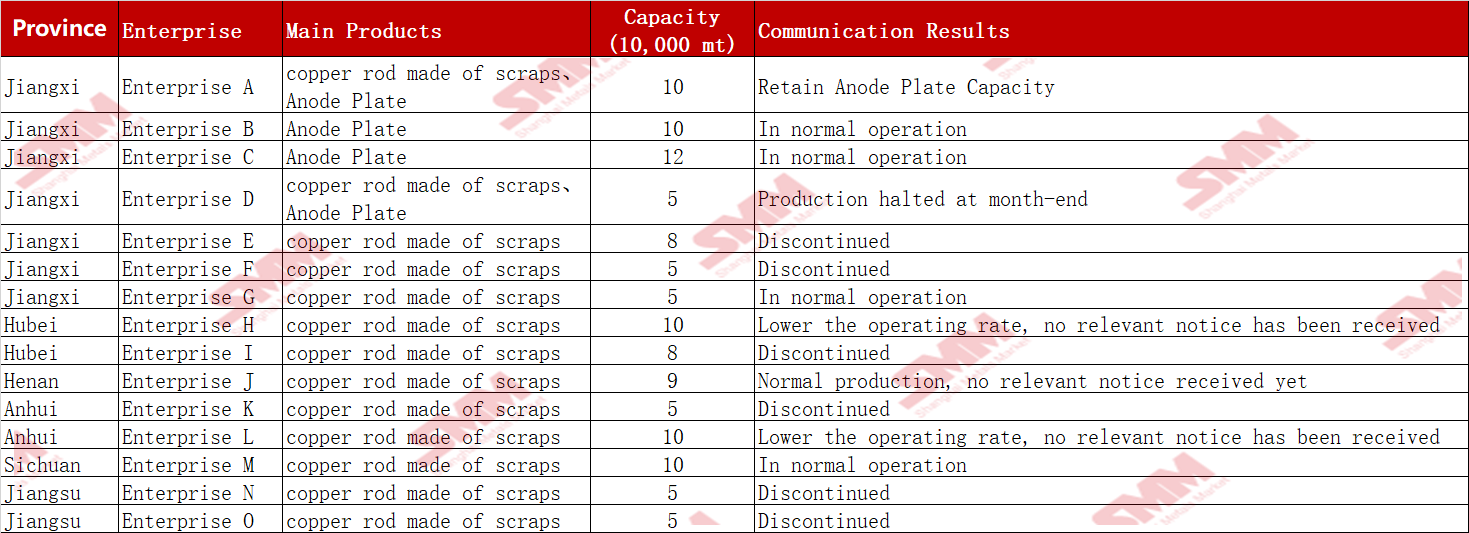According to SMM, based on the notice "On Standardizing Policies for Attracting Investment" (Notice No. 770 of 2025) issued by four national ministries and commissions including the National Development and Reform Commission, local governments were required to standardize their policies for attracting investment. Additionally, any non-compliant contracts signed after May 2024 needed to be terminated by August 31, 2025. However, in mid-August, secondary copper rod enterprises and scrap anode plate producers across the country stated that they had only become aware of the notice but had not yet received specific instructions from relevant authorities. Despite this, production at many companies had already begun to change. Therefore, the SMM recycling resources team headed to Jiangxi, visiting enterprises directly to gain a comprehensive understanding of how policy changes were impacting businesses. The following is the feedback from the companies (along with communication situations from other regions).

Currently, the policy changes have significantly impacted regions in Jiangxi and Jiangsu, with many enterprises opting to halt production and observe. Meanwhile, companies in Hubei, Henan, Anhui, and Sichuan stated they have not yet received specific notifications from relevant authorities, thus maintaining their normal production schedules. However, some enterprises, concerned about potential operational losses due to policy changes starting September 1, have chosen to reduce their production efficiency and suspend new orders.
Based on communications with the enterprises, if the preferential policies for attracting investment are completely withdrawn, retaining only the Circular No. 78 of 2015 (hereinafter referred to as "Circular 78"), which stipulates that scrap utilization enterprises producing metals and alloys through smelting and refining, with 70% of raw materials sourced from scrap and retired metal resources, can enjoy a 30% VAT immediate refund after payment, then secondary copper rod enterprises choosing ticketed recycled copper raw materials will see their tax costs rise from 5.5%-6.5% to 8.3%-8.9%. Producers would need to lower the price of non-ticketed copper scrap by 2,500-3,000 yuan/mt to control production costs. However, upstream suppliers may not accept the new prices in the short term, potentially leading to a supply disruption. Scrap utilization enterprises might face insufficient raw material procurement, forcing them to halt production. The market is expected to gradually adapt to the new pricing model, allowing enterprises to resume production subsequently.
If enterprises adopt reverse invoicing for raw material procurement (also retaining Circular 78), in the first scenario where the reverse invoicing amount is within 2.1 million yuan, the enterprise's tax burden increases from 5.5% to 8.4%. In the second scenario, with the reverse invoicing amount within 5 million yuan, the tax burden rises from 5.7% to 8.7%. Overall, under the implementation of reverse invoicing, the cost for secondary copper rod enterprises would increase by approximately 2,400 yuan/mt.
As enterprises began to cut or halt production in August, SMM estimates that the national production of secondary copper rods in August will decrease by at least 30%, reducing the output by around 48,800-114,000 mt. Similarly, anode plate producers, except for those fulfilling long-term contracts, will be affected by the prioritization of ticketed recycled copper raw material procurement, leading to an estimated 20% decline in the national production of scrap-generated anode plates in August, or 10,000-15,000 mt. This will effectively increase the consumption of copper cathodes and reduce the supply of raw materials to smelters in August, but such a small reduction will not impact the production of copper cathodes in August. SMM also believes that this policy will bring a significant increase in the consumption of copper cathodes in September, though it will not greatly affect the production of copper cathodes. SMM believes that the country's active construction of a "unified" market marks China's continuous efforts to optimize the business environment, promote fair market competition, standardize investment promotion, phase out tax incentives, eliminate illegal subsidies, and implement reverse invoicing. It is just a matter of time before these policies are uniformly enforced across the nation. During the policy implementation process, for their own normal development, enterprises need to lower the supply prices of upstream raw materials while increasing the selling prices of secondary copper rods or anode plates. The recycled copper raw materials supply market will require time to gradually adapt to the impact brought by the new policies. In the future, secondary copper rod enterprises will spend more time on how to enhance product competitiveness or explore cost-reduction and efficiency-improvement methods. Many enterprises have reported that the most direct impact of the policy adjustments is that they will relocate back to their original production sites or move closer to areas where end-use consumption enterprises are concentrated. SMM will continue to monitor the enforcement of relevant policies and the movements of enterprises.



